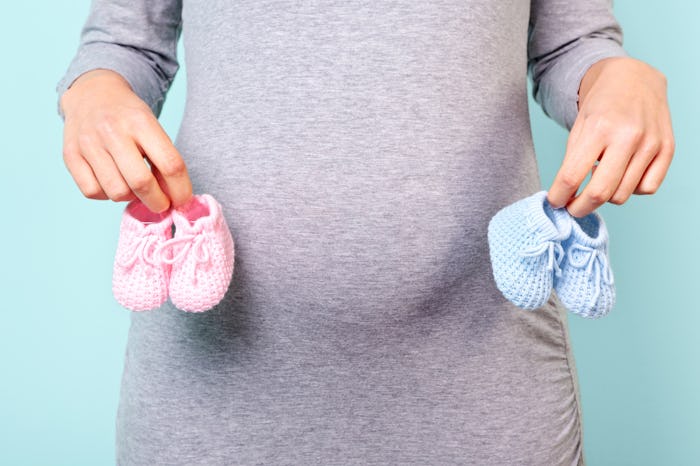Life

11 Myths About Being Pregnant With Twins
All pregnancies are special, but being pregnant with twins forces you to play the baby game on a whole different level. Sure you get double the joy, but you also get double the inquiries from well-meaning, nosy people. Even in the information age, there's something about twins that brings out the superstitious nature in even the most level-headed person. So knowing the myths about being pregnant with twins and how they differ from the reality, can help you maintain your sanity during this special and sometimes stressful time.
Whether you've always dreamed of having twins or the appearance of a second baby in the ultrasound picture took you by surprise, it's helpful to separate fact from fiction. In some ways having twins is not that different from any pregnancy, but in other ways it's a whole different world. For instance, you may need a little extra nutrition, doctor's checkups, and closer monitoring of your due date. Fortunately, plenty of women go on to have perfectly healthy, happy twin babies without any major complications during their pregnancy or delivery. Although you may be in for double the work, you'll get the joy of helping two sweet babies find their way to adulthood.
Myth #1: Morning Sickness Is Worse With Twins
Sure, some women who have twins do suffer from awful morning sickness. But as noted by Baby Center, there is not a direct correlation between women who are having twins and increased morning sickness. One does not necessarily lead to the other.
Myth #2: Identical Twins Run In Families
If your cousin just had a pair of twins, does this mean your pregnancy has an above-average chance of following suit? Not necessarily, although this depends on the type of twin you're thinking about. According to the National Health Service (NHS), identical twins do not run in families, and all pregnant women have the same odds of having them. However, as further explained by NHS, non-identical twins may be a trait from the mother's side of the family.
Myth #3: Twins Skip A Generation
Again, it's tempting to look toward your own family tree for hints about your potential for carrying twins. But as noted in Babble, twinning does not skip a generation even if it has a genetic component. It's a cool theory, though.
Myth #4: A C-Section Will Be Necessary
When you're carrying twins, then it may seem like a C-section is the only way out. You can deliver twins vaginally, as explained in Parents, but this depends on your own health and the state of your pregnancy. It all depends on your health, your babies' development, and what your healthcare provider feels is best in your situation.
Myth #5: Ultrasounds Are The Only Way To Detect Them
Sure, ultrasound technology cannot be topped, but it may not be the only way your doctor will determine you're having twins. As explained by the Huffington Post, some healthcare providers may learn you're having twins by hearing two heartbeats in the stethoscope. This may be the most adorable way to find out the news.
Myth #6: Fertility Drugs MUST Be Involved
Granted, plenty of women who take fertility treatment fall pregnant with multiples. As noted by the Huffington Post, however, plenty of women still conceive twins without any additional intervention. Sometimes twins just happen on their own.
Myth #7: All Pregnancies Begin With Twins
One of the more interesting ideas is the thought that all pregnancies begin as twins. But as noted by the National Health Service, some pregnancies do begin as twins, but one of the embryos does not survive. This is known as vanishing twin syndrome.
Myth #8: Your Pregnancy Will Last Forever
When you're having two babies at once, it may look like your pregnancy will go on extra-long. In the case of twins, however, the opposite is likely true. What to Expect noted that most twins are born early, around week 35 of the pregnancy. This may come as welcome news when you're slogging through those last long weeks.
Myth #9: You Will Gain SO Much Weight
Has an acquaintance or loved one made a big deal about how huge you're going to get? The reality may not be so dramatic. In fact, according to the American Pregnancy Association, women with twins are encouraged to gain 35 to 45 pounds during their pregnancy, which is just ten pounds over the general guideline for women with singleton births. Chances are, it won't be that big of a deal.
Myth #10: The Same Guidelines Of A Singleton Birth Apply
Although women carrying twins are not completely different from their single-baby counterparts, there are some extra things the mamas of multiples may need to pay attention to. According to the Mayo Clinic, women with twins may need more doctor checkups, different nutrition, and greater precautions than those with twins.
Myth #11: Twin Pregnancies Are Random
Some mothers may be more prone to having twins than others, regardless of genetic predisposition for non-identical twins in her family background. According to Modern Mom, advanced maternal age (being 30 or older) can increase your odds of conceiving twins. Whatever the odds, hopefully you and your babies will have a safe and healthy delivery.